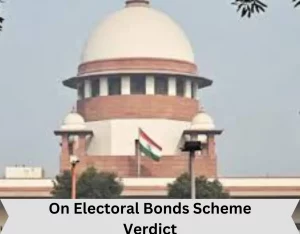ForumIAS announcing GS Foundation Program for UPSC CSE 2025-26 from 19 April. Click Here for more information.
Source: This post on Electoral Bonds Scheme Verdict has been created based on the article “Supreme Court’s electoral bonds verdict turns back the clock” published in “Indian Express” on 16th February 2024.
UPSC Syllabus Topic: GS Paper 2 Governance – Important aspects of governance, transparency and accountability.
GS Paper 4 Ethics – Information sharing and transparency in government.
News: The article discusses the recent Supreme Court verdict on electoral bonds.
A detailed article on the Electoral Bonds Scheme Verdict can be read here.
Background:
The Supreme Court (SC) struck down the Electoral Bonds (EB) Scheme (2018), by holding all the amendments made in the Representation of People Act (RPA), the Companies Act (CA) and the Income Tax Act (ITA) violative of the fundamental right to information under Article 19(1)(a) and the right to equality (Article 14) of the Constitution. On Electoral Bonds Scheme Verdict
What were the provisions?
1) Exclusion from Reporting to ECI: The amendment in RPA excluded the EBs from the requirement of mandatory reporting by political parties to the Elections Commission of India (ECI).
2) Tax Exemption: ITA was amended to make cash donations of only Rs 2,000, received other than by way of cheque, bank draft, electronic clearing system or electoral bonds, eligible for tax exemption from income tax.
3) Ceiling on Contribution Removed: The amendment of the CA had the effect of making every company, loss-making or profit-making, eligible to make unlimited corporate funding to political parties. The earlier ceiling of 7.5% of profits was removed.
All the above amendments were held unconstitutional.
What are the other provisions in the SC judgment?
1) No Fresh Issue of Electoral Bonds: It stops the State Bank of India (SBI) from issuing any more EBs.
2) Details of Purchase of EBs to be submitted to ECI: SBI has been directed to submit the details of EBs purchased to the ECI. The details shall include the date of purchase, the name of the purchaser and the denomination of the electoral bond.
SBI has also been directed to submit the details of the political parties, which received and deposited the contributions through EBs.
3) Publishing of these Details: ECI has been directed to publish the information received from the SBI on its website by March 13.
What are the principles used by the SC to base its judgment on?
- Ensure Transparency in Governance: The SC laid stress on the virtues of “open governance” and the idea that “information about funding of political parties is essential for the effective exercise of the choice of voting”.
- Prevent Undue Influence over Policymaking: The SC wanted to discourage/stop corporate funding for political favours, since political contributions enhance access to legislators and influence over policymaking.
- Violates Right to Information: SC accepted that the purpose of curbing black money could be a legitimate objective of EBs. However, it viewed EBs as infringing on the right to information.
What are the challenges which still remain in the case of electoral funding?
1) Corporates may resort to making completely unaccounted political donations.
2) Only profitable corporates would be able to make political donations within the limit of a maximum of 7.5% of profits. According to the authors, though this route was always available, it was seldom used and is unlikely to be used in the future as well.
Question for practice:
What were the principles relied on by the Supreme Court in its electoral bonds verdict? What are the challenges which still remain in the case of electoral funding?





